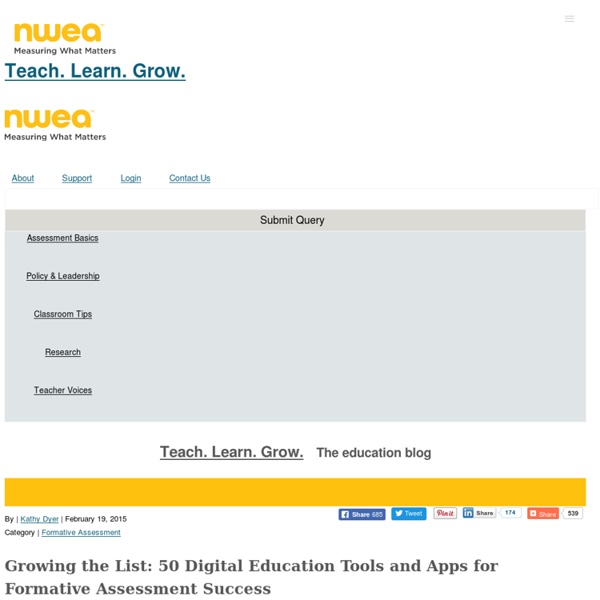50 Digital Education Tools and Apps for Formative Assessment Success
The beauty of formative assessment is that there is no shortage of strategies and techniques available to teachers to use in their classroom. They provide teachers the valuable feedback they need to adjust their teaching so student learning moves forward. Today, digital tools available in smartphones and tablets make implementing formative assessment as easy and effective as ever. Back in April, we updated our growing list of digital formative assessment tools and it’s time to update that list again. We’re now at 50 digital education tools and apps that can help teachers implement formative assessment in the classroom, and this list can surely continue to grow. AnswerGarden – A tool for online brainstorming or polling, educators can use this real time tool to see student feedback on questions.Ask3 – This app for the iPad allows students and teachers to collaborate on lessons both in and outside of the classroom.
50 Education Technology Tools Every Teacher Should Know About
Technology and education are pretty intertwined these days and nearly every teacher has a few favorite tech tools that make doing his or her job and connecting with students a little bit easier and more fun for all involved. Yet as with anything related to technology, new tools are hitting the market constantly and older ones rising to prominence, broadening their scope, or just adding new features that make them better matches for education, which can make it hard to keep up with the newest and most useful tools even for the most tech-savvy teachers. Here, we’ve compiled a list of some of the tech tools, including some that are becoming increasingly popular and widely used, that should be part of any teacher’s tech tool arsenal this year, whether for their own personal use or as educational aids in the classroom. Social Learning These tools use the power of social media to help students learn and teachers connect. Learning Lesson Planning and Tools Useful Tools
Word Search Puzzle Generator
Word SearchPuzzle Generator Oops! We're upgrading our server right now and this feature is temporarily unavailable. It'll be back up and running shortly! Members who are logged in will be able to save puzzles. Word Search Puzzle Generator Images Below are two examples of beginner and intermediate Word Searches! Copyright 2015 Super Teacher Worksheets Word Search Puzzle Generator
I siti per scoprire se un lavoro è stato copiato
Non c’è niente di peggio che trovare un proprio articolo copiato su qualche altro sito. Senza nemmeno una citazione. Il tempo della ricerca e l’impegno non sono una cosa da trascurare, e il plagio lo fa. A scuola e nelle università copiare è proibito, o quantomeno sanzionato. Per rimediare esistono degli strumenti che permettono di identificare articoli copiati, del tutto o in parte (molto più efficaci della semplice ricerca su Google). 1. Il miglior “rivelatore di plagio” è, senza ombra di dubbio, Copyscape. 2. Gratis e facile da usare. 3. Permette di trovare contenuti copiati in tutta la rete: basta inserire un articolo (massimo 1000 parole) o un file di testo nel box di ricerca. 4. Il più versatile: permette di inserire l’articolo intero nel box di ricerca, analizzare la Url di un sito sospetto e, infine, carica un articolo. 5. Esamina articoli fino a 25mila parole, cerca e trova i duplicati, le copie, i plagi.
Related:
Related:



